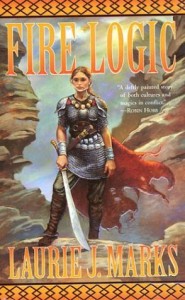 Fifteen years after the fall of the House of Lilterwess, the land of Shaftal is dying, torn apart by a vicious guerilla war between the native Shaftali and the conquering. Without an earth-witch, without the power of the G’deon to rule and heal the land, there seems to be no hope. The former defenders of Shaftal are scattered or slaughtered, waging a desperate war in the hills and forests as their loved ones suffer the repercussions and reprisals. Along the border, the fiercely independent Ashawala’i have been all but exterminated, leaving a single survivor to seek vengeance, and perhaps a death of her own. For too long, the earth has been fed by the blood of the innocents and the guilty alike, but now, several farflung elements have begin to come together, inexorably drawn to one another by destiny and forces beyond their control.
Fifteen years after the fall of the House of Lilterwess, the land of Shaftal is dying, torn apart by a vicious guerilla war between the native Shaftali and the conquering. Without an earth-witch, without the power of the G’deon to rule and heal the land, there seems to be no hope. The former defenders of Shaftal are scattered or slaughtered, waging a desperate war in the hills and forests as their loved ones suffer the repercussions and reprisals. Along the border, the fiercely independent Ashawala’i have been all but exterminated, leaving a single survivor to seek vengeance, and perhaps a death of her own. For too long, the earth has been fed by the blood of the innocents and the guilty alike, but now, several farflung elements have begin to come together, inexorably drawn to one another by destiny and forces beyond their control.
For Emil, a scholar-turned-military leader, the passing of the seasons represents yet another year spent fighting, suffering, and giving his life to try and retake Shaftal. Meanwhile, the half-blooded metalsmith Karis continues to struggle with her growing addiction to the drug called smoke, an addiction guaranteed to kill her whether she surrenders to its oblivion, or tries to resist it. And for the last Ashawala’i, Zanja na’Tarwein, it seems as though her time on this world is at an end, as she’s captured, crippled, and tortured by the Sainnites that she’s fought for so long. But when Karis, driven by visions, rescues and heals Zanja, she links the courses of their lives. No matter how far they are from one another, it’s a sure bet they’ll come back together before long. These three, and more, are drawn up in a drama bound to heal Shaftal and return it to its rightful inhabitants, or destroy it once and for all.
Fire Logic is a fascinating beginning to a multi-book saga placing an emphasis on mysticism and emotion. The main characters revolve around one another, linked by ties of friendship, obligation, love, and dependence, forming emotional bonds that all but leap off the page. The unusually laissez-faire attitude the characters assign to gender and sexuality lend an alien air to the setting, placing it apart from more traditional fantasies. While the plot occasionally gets bogged down in the same mystic elements which make it interesting, especially in the detailed explorations of elemental magic and divinatory glyphs, it still manages to keep moving towards the conclusion, which feels more like a respite between acts than it does the end to a story. Of course, as the included preview of Earth Logic, the next book in the series, indicates, there’s still much left to be told in the saga of Karis, Zanja, Emil, and their loved ones. I’m certainly looking forward to seeing how it comes together in the end.
Originally posted on SF Site, 2004
